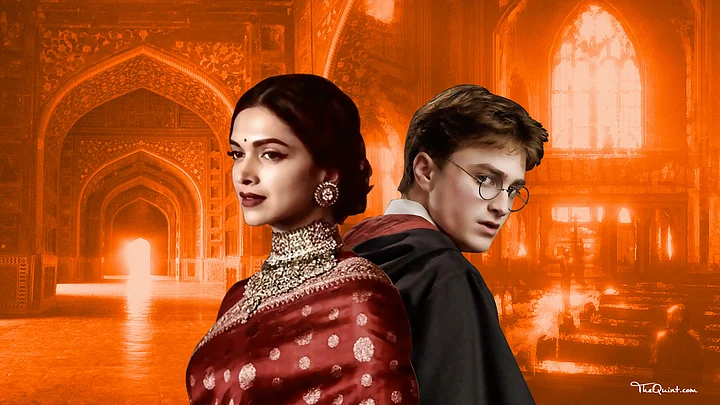Delhi, 2100 AD
The city is in chaos. Newspapers selling in shiny, steel-covered lanes of New Delhi are filled with shimmering holograms analysing just one news.
"Noted filmmaker attacked for desecrating Harry Potter by devout group affiliated to Church of Potter."
Ajay Kumar, one of India's most celebrated filmmakers, has run into trouble for distorting history by depicting a romance between Harry Potter and Hermione in his latest 6D film. The group calling themselves 'Dumbledore's Army' have taken objection to this factual inaccuracy since it is a well-known historical legend that Hermione Granger was married to Ron Weasley.
Some historians like Irshad Hashim have come forward to argue that Harry Potter was a fictional character, and he first found mention in a fictional novel written by a British author J K Rowling in 2002 AD. Futhermore, experts are also divided over different versions of the written Harry Potter legend, with a historian at University of Delhi putting forth a manuscript, authored by FanFicNet where Harry Potter and Hermione are married.
While the historical accuracy of the issue is debated, Kumar has put out a statement that he is halting the film currently.
Padmavati is Fiction, How Can it Be Distorted?
Whether newspapers will be around (in their hologram glory) in 2100 AD can be a matter of debate, but it is not far-fetched to think a Padmavati-esque controversy erupting over Harry Potter in the future.
When Sanjay Leela Bhansali was attacked for his film Padmavati, which allegedly showed a romance between the queen and Delhi sultan, Alauddin Khilji, historians were taken aback. Mainly, because queen Padamavati does not exist in history.
It has been well documented by medieval historians that Padmavati was a character, created by poet Malik Muhammad Jayasi, in the 16th century. Jayasi had written an epic Sufi poem called Padmavat about Padmavati, queen of Chittor. In the poem, Padmavati is married to Rana Rawal Singh, and she kills herself to save Rajput honour in the face of capture by Alauddin Khilji. The epic was written nearly 200 years after the siege of Chittor, and is considered to be a landmark in Awadhi language.
But, it is fiction.
This essentially means that when Sanjay Leela Bhansali was attacked by Rajput Karni Sena in Jaipur, they were taking offence to a creative visualization of a fictional legend. An extremely popular legend, but still a fiction.
In 2017, a creative interpretation of a fictional legend can be attacked on charges of distorting history like Padmavati. So, why is it hard to imagine that seventy years down the line, Harry Potter becomes an urban legend; replete with a Church which takes offence at a non-canonical interpretation of the books? (Harry and Hermione, in this case.)
Taking Offence Over a Legend... And Getting Away With It
A legend is defined by Merriam-Webster dictionary as ‘a story coming down from the past which is popularly regarded as historical although not verifiable.’
But the siege of Chittor (and the non-existence of queen Padmavati) is easily verifiable.
The siege of Chittor by Turkish Sultan Alauddin Khilji took place in 1303. But historians estimate that Khilji’s conquest of Chittor had to do with territorial expansion, and not lust for an imagined queen. According to Anirudh Deshpande in a Times of India report:
Chittorgarh was coveted by Delhi sultans for strategic and commercial reasons. With the passage of time, events are imbibed with cultural meanings, which have more to do with politics and less with history.
Amir Khusrau, who accompanied Alauddin Khilji on his conquest of Chittor, has never mentioned queen Padmavati in his chronicle, says historian Satish Chandra while talking to The Indian Express. Most modern historians in India reject the legend of Padmavati as just that, a legend, not historical fact.
Importantly, Jayasi’s epic poem Padmavat is believed to be an allegory, with the poet never claiming to chronicle the siege of Chittor. The Imperial Gazetter of India in 1909 comments on Jayasi’s book thus,
In the final verses of his work, the poet explains that it is all an allegory. By Chittor, he means the body of man; by Ratan Singh, the soul; by the parrot, the guru or spiritual protector; by Padmavati, wisdom; by Alauddin, delusion, and so on.
In literary terms, Padmavat is then classified as historical fiction. The 2016-equivalent of a Padmavat would be Harry Potter, with wizards swarming over King’s Cross in London and Muggles living in their own reality. There are alternative, non-canonical narratives about the characters in the Harry Potter universe, authored by readers, known as ‘fan fiction’. It’s possible that it may imaginably be taken as alternative versions of Harry Potter ‘legend’ hundred years later.
But, even when it becomes legend, Harry Potter will always remain a work of fiction. Just like Queen Padmavati, since it is acknowledged to be a creation of Jayasi’s pen, will always be a fictional character. So, why are we taking offence over a fictionalised version of a fiction?
(This story was originally published on 1 February 2017 and is being reposted from The Quint’s archives ahead of the release of Sanjay Leela Bhansali’s ‘Padmavati’.)
